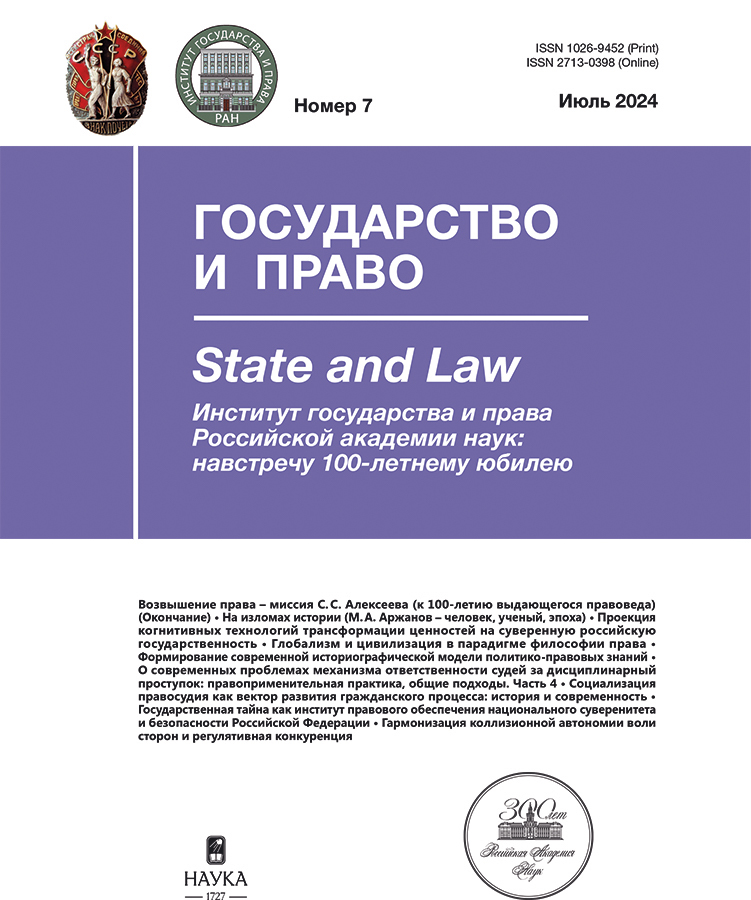The role Beccaria’s on crimes and punishments on the formation of Bentham’s utilitarian theory of criminal liability
- Authors: Kolosov I.V.1
-
Affiliations:
- Ministry of Economic Development of the Russian Federation
- Issue: No 7 (2024)
- Pages: 98-104
- Section: Legal, political, philosophical and religious thought
- URL: https://journals.eco-vector.com/1026-9452/article/view/649139
- DOI: https://doi.org/10.31857/S1026945224070086
- ID: 649139
Cite item
Abstract
In the article, the author substantiates the continuity of the legal ideas of utilitarianism in relation to criminal punishment, which led to the formation of a holistic doctrine. Beccaria’s “On Crimes and Punishments” (1764) been considered a theorist of criminal law and criminology, who proceeded from the principle of utility. At the same time, traditionally in jurisprudence, including in the field of criminal law, the principle of utility begins to be applied only in connection with the publication of the work of Bentham’s Introduction to the Foundations of the Morality of Legislation in 1789. How did Beccaria’s treatise influence the formation of Bentham’s utilitarian view of the criminal liability? What did Bentham borrow from Beccaria? Was Bentham’s utilitarianism original? As a result, the theoretical foundations for a transparent, consistent and egalitarian justice system were created, in which punishment should be proportionate to the crime, applied promptly and in a way that is understandable to all. As a result, Beccaria’s On Crimes and Punishments had a significant impact, first on the philosophy of Bentham, and then on the reform of criminal law in the Western Europe.
Full Text
About the authors
Igor V. Kolosov
Ministry of Economic Development of the Russian Federation
Author for correspondence.
Email: i.v.kolosov@yandex.ru
PhD in Law, Head of the Division of Legislation in the Spheres of Financial, Banking and Investment Activities of the Legal Department
Russian Federation, MoscowReferences
- Didikin A. B. Bertrand Russell’s Epistemology: on the way to neutral monism // Omsk Scientific Herald. Ser.: Society. History. Modernity. 2022. Vol. 7. No. 1. Pp. 84–90 (in Russ.).
- Kechekyan S. F. On the interpretation of laws by the court // Problems of the history of society, state and law: collection of scientific tr. mezhreg. correspondence scientific Conference Yekaterinburg, 2020. P. 255 (in Russ.).
- Russell B. Selected works / transl. from English by V. V. Tselishcheva, V. A. Surovtseva. Novosibirsk, 2009. Pp. 180–191 (in Russ.).
- Reshetnikov F. M. Beccaria. M., 1987. P. 72 (in Russ.).
- Yumashev Yu. M. Beccaria and Russia // State and Law. 1995. No. 7. P. 137 (in Russ.).
- Audegean P. La Philosophie de Beccaria. Savoir Punir, Savoir Ecrire, Savoir Produire. Paris, 2010.
- Baumgold D. Contract Theory in Historical Context: Essays on Grotius, Hobbes, and Locke. Leiden, Boston, Brill, 2010. P. IX.
- Beccaria C. An Essay on Crimes and Punishments. Albany, 1872. Footnote 1. Pp. 10, 12, 15, n. 20, 34, 39. Chaps. IV, V, XIX, XX, XXVIII.
- Bentham J. An Introduction to the Principles of Morals and Legislation. Dover Publications, 2007. End of Chap. XIV.
- Bentham J. Theorie des Peines et des Recompenses. Tome 1 / par M. Jeremie Bentham, redigee en francois, d’apres les manuscrits, par. M. Et. Dumont. 1811. B. Dulau (Londres). P. VIII.
- Bentham J. Theory of Legislation / transl. Hildreth. 2nd ed. London, 1874. Pp. 76, 353, 354.
- Bowring J. (ed.) The Works of Jeremy Bentham. Edinburgh, 1838– 1843. Vol. I. P. 150, 323, 388–532, 558, 559; vol. III. Pp. 160, 180, 181, 217, 286, 287; vol. V. Pp. 235, 519, 520; vol. VII. Pp. 311– 315; vol. VIII. Pp. 125–127, 206, 207, 247, 248.
- Burns J. H., Hart H. L.A. (ed.). Of Laws in General: The Collected Works of Jeremy Bentham. London, 1970. P. 294.
- Ehrlich I. Crime, Punishment, and the Market for Offenses // Journal of Economic Perspectives. 1996. No. 10. Pp. 55–63.
- Hart H. L.A. The Concept of Law. Oxford, 1961. Pp. 199, 200.
- Holmes O. W. The Path of the Law // Harvard Law Review. 1897. Vol. 10. No. 8. Pp. 457–478.
- Levitt S. D. The Effect of Prison Population Size on Crime Rates: Evidence From Prison Overcrowding Litigation // The Quarterly Journal of Economics. 1996. No. 111. P. 319.
- Pyle D. J. The Economic Approach to Crime and Punishment // Journal of Interdisciplinary Studies. 1995. No. 1. Vol. 6. Pp. 4–8.
- Ricciardi M., Santoni de Sio F. Cesare Beccaria: Utilitarianism, Contractualism and Rights. Philosophical Inquiries. II. 2–2014. Pp. 21, 83, 84.
- Scanlon T. M. What We Owe to Each Other. Cambridge, MA, 1998. P. 153.
Supplementary files










